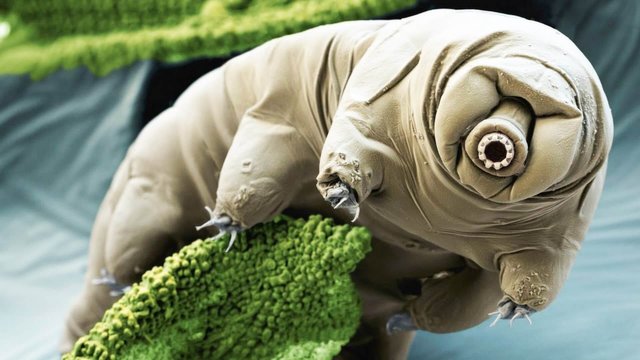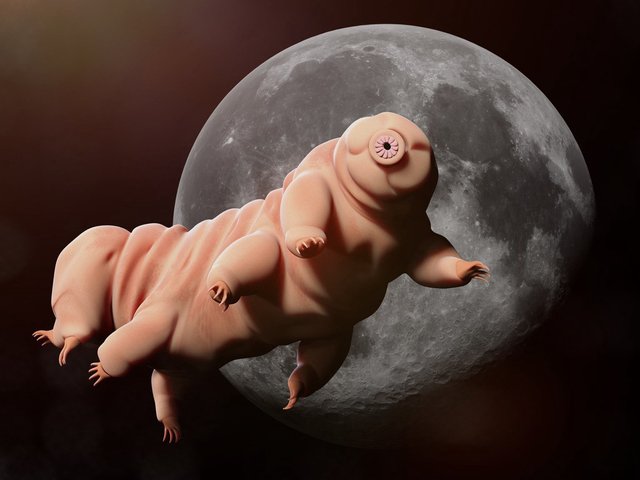
Source
Tardigrades, also called water bears, are microscopic animals with an average size of 500 micrometers (half a millimeter) discovered by Johann August Ephraim Goeze in 1773 who gave them the name "Water Bears", years later the naturalist Lazzaro Spallanzani would give them the name "Tardigrades" for their way of moving.
Los tardígrados, también llamados osos de agua, son unos animales microscópicos con un tamaño medio de 500 micrómetros (medio milímetro) descubiertos por Johann August Ephraim Goeze en 1773 que fue quien les dio el nombre de "Osos de agua", años más tarde el naturalista Lazzaro Spallanzani les daría el nombre de "Tardígrados" por su forma de desplazarse.
With a size between 0.5 and 0.05 mm, more than a thousand species are known, most of them terrestrial, they usually live in mosses, lichens and ferns but can live anywhere since they are Extremophilic microorganisms that can resist the most adverse conditions of temperature, dehydration and can even survive in the vacuum of space.
Con un tamaño entre 0,5 y 0,05 mm se conocen más de mil especies la mayoría de ellas terrestres, habitualmente viven en musgos, líquenes y helechos pero pueden vivir en cualquier parte pues son microorganismos extremófilos que pueden resistir las condiciones más adversas de temperatura, deshidratación e incluso pueden sobrevivir en el vacío del espacio.

Source
During the last years NASA has used them to carry out experiments to test their resistance to changes in gravity and radiation, which is why they are part of the select club of animals that have visited outer space, the last trip they made last June 5,000 of these tardigrades were sent into space.
Durante los últimos años la NASA los ha utilizado para realizar experimentos para probar su resistencia a los cambios de gravedad y a la radiación por lo que forman parte del selecto club de animales que han visitado el espacio exterior, el último viaje lo han hecho el pasado junio, que se enviaron al espacio 5.000 de estos tardígrados.
Despite spending so many years studying these organisms, scientists had not yet been able to record how tardigrades move around until last month when they managed to film the bug in the middle of a walk, with it they discovered that these microorganisms move in a similar way to insects.
A pesar de llevar tantos años estudiando estos organismos los científicos todavía no habían podido registrar cómo hacen los tardígrados para desplazarse hasta el mes pasado que consiguieron filmar al bicho en plena caminata, con él descubrieron que estos microorganismos se desplazan de forma similar a los insectos.

Source
Although normally such small animals lack limbs, tardigrades have 8 legs that move synchronously like any other arthropod, according to experts the key is in how the ribs move when walking, which can be seen in the video apparently, something fascinating for another part, I never imagined they had ribs.
Aunque normalmente los animales tan pequeños carecen de extremidades los tardígrados poseen 8 patas que mueven sincrónicamente como cualquier otro artrópodo, según los expertos la clave está en cómo mueven las costillas al andar cosa que se puede observar en el vídeo según parece, algo fascinante por otra parte, nunca imaginé que tuviesen costillas.
Now scientists are racking their brains to explain why a microorganism so small and apparently so distant from insects uses a similar means of locomotion, from these studies can obtain valuable information for the design of mechanisms of locomotion for microscopic robots in the health field, for example.
Ahora los científicos se están devanando los sesos para explicarse por qué un microorganismo tan pequeño y aparentemente tan lejano de los insectos utiliza un medio similar de locomoción, de estos estudios pueden puede obtener información valiosa para el diseño de mecanismos de locomoción para robots microscópicos en el campo de la salud, por ejemplo.
More information/Más información
https://www.rockefeller.edu/news/30904-the-physics-behind-a-water-bears-lumbering-gait/
Hola @mauromar, eso camina como una lagartija sin cola pero lo que en realidad me sorprendió es el tamaño.
Downvoting a post can decrease pending rewards and make it less visible. Common reasons:
Submit
Y eso de que tengan costillas como un marrano?
No me imagino una barbacoa de tardígrados.
Downvoting a post can decrease pending rewards and make it less visible. Common reasons:
Submit
Hola @mauromar, estos tardígrados son como ningún otro ser vivo.

Pareciera que tienen la capacidad de morir y luego revivir, es algo realmente loco.
Downvoting a post can decrease pending rewards and make it less visible. Common reasons:
Submit
Thanks for sharing this important information.
Downvoting a post can decrease pending rewards and make it less visible. Common reasons:
Submit
I knew something new from your blog. Thank you.
Downvoting a post can decrease pending rewards and make it less visible. Common reasons:
Submit
I like to read your blogs because your blogs are very knowledgeable
Downvoting a post can decrease pending rewards and make it less visible. Common reasons:
Submit
This concept was totally new to me, Thanks for your perfect explanation.
Downvoting a post can decrease pending rewards and make it less visible. Common reasons:
Submit
Well look how interesting thing, I never imagined this microorganism as complex and almost normal as others, thanks for this contribution, really very interesting.
Downvoting a post can decrease pending rewards and make it less visible. Common reasons:
Submit
Thank you for your comment Joseph.
Downvoting a post can decrease pending rewards and make it less visible. Common reasons:
Submit
you explained it so well, good day.
Downvoting a post can decrease pending rewards and make it less visible. Common reasons:
Submit
i didnt see things like it before, thanks for sharing.
Downvoting a post can decrease pending rewards and make it less visible. Common reasons:
Submit
Those tardigrades look like pigs, of course, with the difference among others that they are microscopic and have eight legs, hehehe
Downvoting a post can decrease pending rewards and make it less visible. Common reasons:
Submit
It will be very hard to make a barbecue of tardigrades
Downvoting a post can decrease pending rewards and make it less visible. Common reasons:
Submit
It was an awesome video of a walking Tardigrades. Thank you.
Downvoting a post can decrease pending rewards and make it less visible. Common reasons:
Submit
Hello @mauromar
This looks like something out of a science fiction movie. But, luckily microscopes are getting more and more powerful and allow to magnify up to 20mil or more times the size of those tiny organisms.
I am amazed at the resistance they have to temperatures and more. Waiting to see what they can discover and what they can be applied to improve human health.
Downvoting a post can decrease pending rewards and make it less visible. Common reasons:
Submit